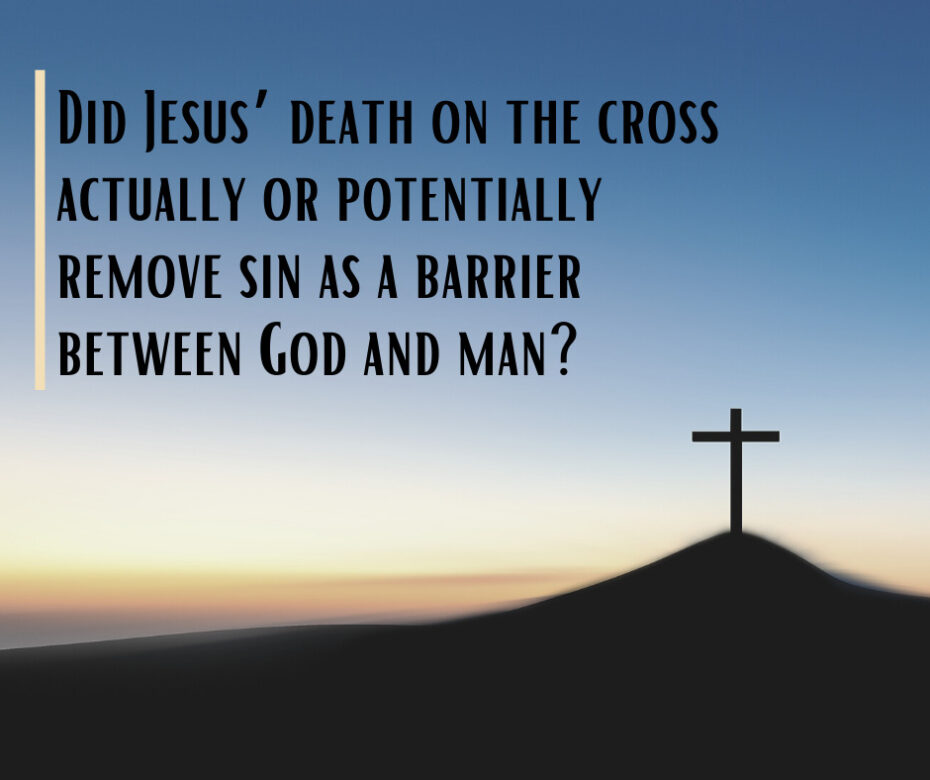Check out this short but powerful question I recently received:
Thank you for your ministry. I have a question. When the Bible says that Jesus died for the sins of the world (1 John 2:2), does that mean that Jesus died for everyone’s sin, or does it mean that you need to believe that Jesus died for your sins for it to be applicable to you?
Limited atonement is the Calvinist view that Jesus did not die on the cross for everyone’s sins. He died on the cross for the sins of the elect. In this view, the vast majority of people cannot be born again because Christ did not die for them. Worse, you can’t know until you die whether Christ died for you or not. You go through life looking at your works and wondering if they are sufficiently good to give you a high degree of confidence that you are one of the few people God chose to have everlasting life. Of course, you know you could fall away in the future, and if you do, you will show you probably were not elect. So, uncertainty follows you all the days of your life.
Calvinists believe that if Christ died for everyone, then everyone would be saved. Since the Bible clearly rejects universalism, Calvinists reject unlimited atonement.
I was trained in seminary that Christ died for everyone (John 1:29; 1 John 2:2). His death was unlimited. But that does not promote universalism. In order for a spiritually dead person to gain everlasting life, he needs more than the sin barrier to be removed. That simply makes people savable. To be born again, the spiritually dead person needs everlasting life. Only those who believe in Jesus Christ for the free gift of everlasting life have that life. The reason why faith in Christ for everlasting life is the only condition is because at Calvary, Christ took away the sin of the world (John 1:29).
I would call that the traditional understanding of unlimited atonement. Christ’s death was not only sufficient for all—the Calvinist view—but it is also efficient for all. That is, our sins do not bar us from everlasting life. The moment the sinner believes in Christ for everlasting life, he is secure forever.
A second understanding of unlimited atonement has emerged. The questioner does a good job of articulating it: “you need to believe that Jesus died for your sins for it to be applicable to you.” Several years ago, a friend of mine met with me and the entire GES board at our annual conference. He wanted to discuss three issues, one of which was the atonement.
He had graduated from DTS shortly before I started. He indicated that he had been taught at DTS that the death of Christ was sufficient for all, but only efficient for those who believe that He died on the cross for their sins.
While my friend calls that view unlimited atonement, I call that view limited atonement. If Christ’s death did not take away the sin of the world, but only potentially did so, then many verses are incorrect (e.g., John 1:29; 3:16; 1 John 2:2).
Notice as well how this changes the content of saving faith. One need not believe in Jesus for everlasting life (John 3:14-18, 36; 5:24; 1 Tim 1:16). He only needs to believe that Jesus died on the cross for his sins. He does not need to believe in Jesus for anything. He need not believe in the free gift of everlasting life. He could believe in works salvation and be born again. The only issue is believing that Christ died for you.
In this view, Roman Catholics, Eastern Orthodox, and nearly all Protestants are born again. Assurance of everlasting life becomes a sanctification issue. It is like a sunroof on a car. It makes your driving experience a bit better, but you do not need it. In the same way, a person never needs to believe that Jesus has saved him once and for all. That is nice information to have, but it is not essential.
At the heart of the so-called crossless gospel controversy is the view that Jesus’ death does not take away anyone’s sins unless and until he believes in substitutionary atonement. This is also the heart of the matter as to whether assurance is of the essence of saving faith.
What is it that we are seeking to persuade the person to whom we witness? Is our ultimate goal to convince that person of substitutionary atonement? Or is our aim more than that? Is our target to persuade him or her that because of the cross our sins are no longer the issue so that all we need to do to be saved is to believe in the Lord Jesus Christ for the everlasting life that He guarantees to the believer?
The board told my friend that they believe that Jesus’ death actually removed the sin barrier for all, and that a person is not born again until he believes that Jesus guarantees the eternal destiny of the believer. That is the position of GES. I trust that is your position as well.


